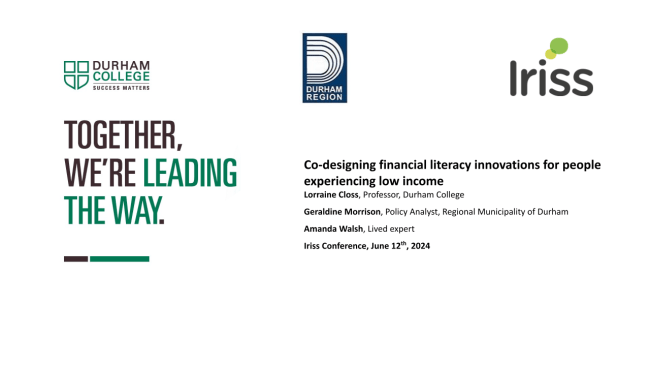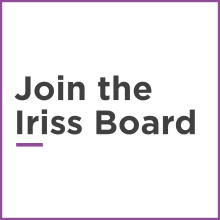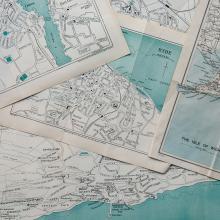Over the last 10 years we have been lucky to have an ongoing relationship with the Regional Municipality of Durham and Durham College in Canada. In that time we have worked alongside colleagues in the Innovation and Research for the Social Services Department in the Municipality and colleagues at the Social Impact Hub in the College. Although the focus of Iriss is on social work and care in Scotland, we always want to learn about approaches elsewhere, and also spread the learning about the work that we have been involved with here.
In 2019, we joined a successful partner bid, led by Professor Lorraine Closs, called Building Bridges Together: Co-production of Financial Empowerment Strategies with People Experiencing Low Income. I was asked to be a part of that given our past work in using co-production in our work. That project is now coming to an end and I wanted to share some of the difference that this has made.
The project was looking to incorporate co-production approaches and values into how the research was carried out, and on how potential solutions could be co-designed and taken forward. I loved this focus, as straight from the start there was the identification of an issue around experiences of poverty and tax filing, there was a need for evidence to be built… but there was also an explicit aim to create change on the back of that research, and to do it with the local organisations and individuals who would be most impacted. Over the last five years, I have been a member of the Steering Group, set up to be able to guide the work. At the beginning, and throughout, a lot of effort was put in to get the group balance correct, and meaningfully involve those with a lived experience of poverty. There were myriad lessons here about getting the right people around that table, those who could share experiences and what would have made a difference to them, but also those who could shape future services and supports. Those who wouldn't normally get paid were compensated for their involvement, and were also given decision-making roles in the group and subsequent action groups, attempting to flatten any previous power differentials. Materials were shared in advance and the meetings were never rushed. And ultimately, a group was created where momentum was maintained and action followed through on.
As many of us do, I often cringe at a clumsy or awkward ice breaker. At the start of each of the Steering Group meetings we were asked to share something - usually something along the lines of - ‘if you were a bird today, what kind of bird would you be and why?’ As a stand alone exercise this may seem flippant, but over time it let the group share a bit about themselves and how they were feeling. Given the length of the work it helped us build a picture of each other and our lives outside this project, and also helped with my knowledge of Canadian culture/animals/food/drinks!! And also (and this is often overlooked!!), the meetings were enjoyable, it wasn't a hardship turning up to these. It was a safe space to share thoughts, and thanks to those involved, there was always news or progress to be shared and reflected on.
Regarding the research, there were some key findings. For those living in poverty there was often a generational mistrust of the system and of tax filing. Those living in poverty did very little planning for the future, and had to live ‘close to the bone’, with no safety net of financial reserves. In Canada, if you don't file your taxes, you also are not part of the system that can receive benefit support and grants. To tackle this, the group held some co-design workshops to try out solutions to help. In March 2024, one of those solutions was launched, a Financial Help Hub (FHH). The FHH is a free, walk-up, touch screen kiosk that is hosted at a community library. It provides information on financial aid supports in the Region including information on food, shelter and financial aid. It also provides financial literacy advice from Prosper Canada and access to a helpline, connecting people to further social services and community supports. The other innovation is a Tax Tycoon board and video game, launched in April 2024. This is an interactive game that aims to help demystify the tax system and reduce tax fear by engaging young people. You can read and see more about this on the Community Based Research Canada page.
By the end of the process, from my vantage point here in Scotland, I felt very much like a happy fly on the wall at the meetings. The project had moved so far that the value had become how the work and solutions could be embedded in place, with individuals and organisations working together to find the best ways to make a difference to those in the Durham area.
As a round off to our Iriss involvement in the work, we were very lucky to host Lorraine, and her colleagues from the project, Geraldine Morrison and Amanda Walsh, at the Iriss Conference in June. The slideset they used at the conference is included below:
The audience also heard, through a Youtube video, from another participant in the work, Marek Kutrowski. He shares in the video the importance of his voice and contribution to the work and how this has influenced him.
You can see a short clip from that conference presentation below.
What resonated strongly on feedback from Conference participants on the day, and my favourite part of the talk, was Amanda sharing her reflection on being part of the work:
‘You do become an agent of change, you’re creating change in yourself, not because something was missing or something was lacking, it’s that true coproduction engages you in a process of revelation and commitment, you become driven to share this with others, with your community because you know the difference it makes, and will make’.
That is exactly why we don't like being involved in work that merely pays lip service to the value of co-production. Co-production is not always the solution, and neither is it a magic wand, but when done well, like it has been here, then the impact shows itself not just in the depth and richness of the research, or the developed solutions, but also in the individuals that have been part of the team.
If you want any more information about this work, please contact Stuart Muirhead at stuart.muirhead@iriss.org.uk, or the project lead, Professor Lorraine Closs at lorraine.closs@durhamcollege.ca




